Tea is a beloved beverage worldwide. Different countries have embraced their own unique tea culture. In Britain, tea is often the go-to solution to almost every problem. In China, it’s a symbol of tradition and mindfulness, while in Japan, the tea ceremony is considered an art form. Turkey celebrates tea as an integral part of hospitality, and in the United States, Northern Americans are stereotypically known for preferring iced, or sweetened tea.
While these cultural stereotypes may offer a snapshot into tea’s appeal, the global tea market is evolving rapidly.
Join Mintel as we dive into the biggest and latest global tea market trends, explore how brands are innovating to meet shifting consumer demands and reveal how you and your brand can stay ahead in a dynamic tea market.
Is the Global Tea Market Growing?
Mintel forecasts that the UK tea market will see a slight increase in value sales by 1.1% to £884 million over 2023-2028, despite a forecasted decline in volume sales. As real incomes begin to rise in the coming years, slowing inflation will see value growth decelerate. Brands will need to diversify to contend with growing competition from coffee, soft drinks and an upturn in foodservice occasions.
The US tea market is experiencing a similar inflationary-influenced landscape. Dollar sales growth in the tea and ready-to-drink (RTD) market has been largely driven by price increases rather than increased consumption. While 83% of US adults drink tea, fewer than 40% of tea drinkers surveyed say that the most common types of tea are a taste they enjoy. With flavour being the Achilles heel of the category, elevating taste perception will be crucial in the growth of the US tea industry.
Despite high inflation, the German market is projected to experience long-term retail growth. Mintel forecasts that German tea market volume sales will grow 4.8% from 2023 to 2028. Several factors contribute to this robust growth, in particular, the popularity of organic tea products, which adheres to consumers’ heightened focus on health and the environment. The German government’s goal to achieve 30% organic agriculture by 2030 also supports this expanding trend.
The tea market in China, particularly tea houses, is entering a maturity stage but is still expected to grow to RMB370.8 billion by 2027. This growth is driven by the evolving nature of tea consumption, now no longer limited to traditional settings, consumers are enjoying tea in both working and relaxing scenarios. Tea houses are also expanding their product portfolios and innovating with functional ingredients to cater to diverse occasions.
The tea market outlook varies by region, but overall, it indicates promising growth. Key drivers include sustainability, health benefits, diverse ingredients and new occasions for tea consumption. Continue reading to find out how these core trends are shaping markets globally and influencing tea consumption around the world.
Brewing a Sustainable Future: Tea Market Trends
Around the world, there is a strong emphasis on sustainability, driven by consumer demand for environmentally friendly and ethically produced products. Here, Mintel outlines a few key ways in which tea brands are brewing bold changes to satisfy eco-conscious consumers.
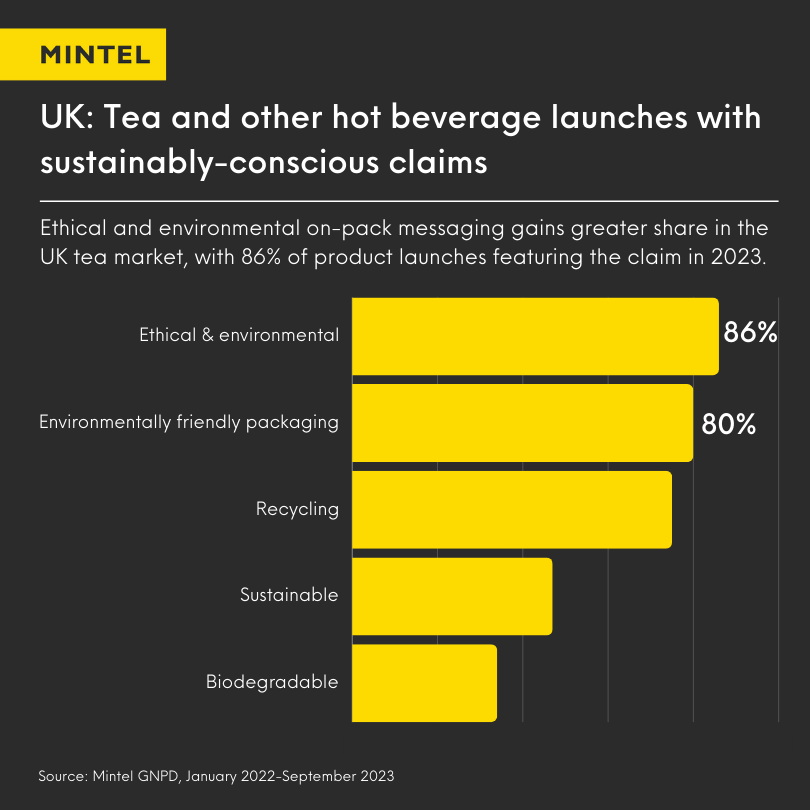

- Transparency and ethical sourcing
Consumers are increasingly seeking transparency in the sustainable sourcing and production of products and services. Over half of German tea drinkers are willing to pay extra for ethically sourced tea, where the extra fee is paid directly to the farmers. Brands are responding by providing on-package information about their supply chains and ethical sourcing practices. One standout initiative that Mintel experts identified in our annual A Year of Innovation in Tea report is by the US-based brand Equal Exchange Organic Hibiscus Tea. This innovative approach has been designed to support and empower small-scale farmers by providing greater market access. This approach not only helps small farmers gain opportunities but also aligns with consumer interest in ethically produced products.In a similar vein, tea brands in the UK are increasingly obtaining certifications such as Fairtrade and Rainforest Alliance to assure their consumers that they are committed to ethical practices, fair worker treatment and improved environmental commitments.
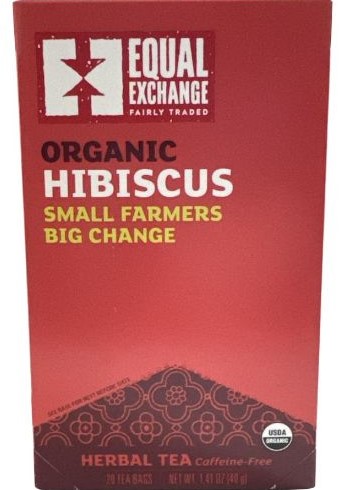

- Regenerative farming practices
To future-proof the tea market, brands are turning to regenerative agricultural practices. This practice is focused on securing the sustainability of tea cultivation by maintaining soil health and biodiversity. These efforts also see brands extending to reducing their carbon footprint by using carbon-efficient ingredients, something which aligns with almost three-quarters of food and drink consumers who expect companies to take responsibility for reducing their carbon emissions rather than relying on offsetting. One brand leading the way is UK-based Kib’s Liven up Hibiscus Tea. Their product is cultivated in “food forests,” which are sustainable agricultural systems designed to replicate natural forest ecosystems. These systems enhance biodiversity, capture carbon, contributing to a more sustainable approach to agriculture.
By integrating regenerative farming into their production, brands can adhere to consumer demand for sustainability and showcase their commitment to environmental stewardship.
Overall, sustainability is becoming a core component of the tea market, with brands making concerted efforts to meet consumer expectations for environmentally responsible and ethically produced products.
Expanding Tea Consumption Occasions
Tea is increasingly being positioned as a beverage for various occasions, driven by changing consumer preferences and innovative product launches.
Tea and snacks: The perfect pair
A curious union is between the snackification trend and the afternoon tea ritual. The snackification trend sees the line between meal and snack boundaries being blurred, where consumers— typically aged 19-24— eat snacks throughout the day, and sometimes even replace traditional meals. Brands are jumping on this trend by encouraging tea as the perfect pairing for various snacks. This strategy sees the traditional afternoon tea ritual revitalised to appeal to younger consumers. In Germany, for example, seven in 10 Gen Z snacks at least once a day and one-fifth of UK 18-24 snack three or more times a day, and often enjoy tea alongside snacks, offering a moment of indulgence and relaxation.
This trend is also evident in markets like Thailand. Nearly half of Thais consume tea during the afternoon, presenting an opportunity for beverage brands to position tea as an ideal companion for salty snacks, which are usually consumed to curb hunger or provide an energy boost in the afternoon. Tea, particularly RTD tea, can further capitalise on this trend by being marketed as a standalone snack, especially if the tea is formatted in a fun way. Products such as biscuit-flavoured teas and bubble milk teas, which are indulgent and sweet, align well with Thai consumers’ preference for fun and sweet beverages as snacks.
The intersection of tea consumption and the snackification trend presents a promising opportunity for brands to innovate and create new consumption occasions that align with consumer preferences for indulgence and emotional wellbeing, as well as integrating tea into more daily life occasions.
Sober curiosity sparks innovation in the tea market
The “sober curious” movement, which sees people choosing to reduce or cut out alcohol, has created opportunities in the tea market. In Germany, for instance, there is a notable trend towards alcohol moderation, with almost half of Germans considering limiting or not drinking alcohol as a way to maintain a health-conscious lifestyle. As a result, seven in 10 German tea drinkers consider tea as a good substitute for alcoholic drinks. Brands have an opportunity to align their marketing strategies with the sober curious trend by highlighting tea as a healthy alcohol replacement that can be linked to the associations with evening and social occasions, as well as emotional cues that usually prompt people to reach for alcoholic drinks, such as comfort or relaxation.
This trend is not limited to Germany and can be applied to other markets where consumers are seeking healthier lifestyle choices. Almost half of UK tea drinkers and one-fifth of US millennial consumers also view tea as a satisfying alternative to alcohol. In response to shifting consumer demands, brands are innovating with development to create versatile products that mimic the flavours of popular alcoholic beverages. One standout example is Meßmer’s Gin Lemon Style Fruit Hot Tea which offers the taste experience of gin lemon while maintaining a very low alcohol content. This innovative approach appeals to consumers who are looking to reduce their alcohol intake without sacrificing the experience of enjoying a flavorful drink.
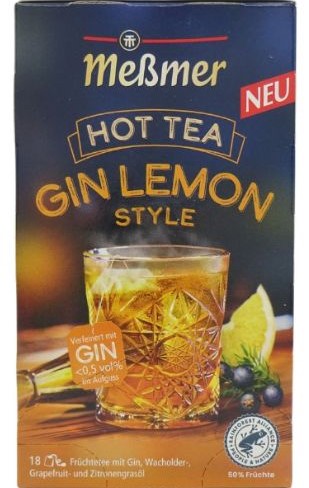

Overall, the sober curious movement is fueling growth in the tea market by creating new opportunities of tea consumption, as more brands position it as a desirable, healthy alternative to alcohol which fits seamlessly into social or relaxation occasions.
The Rise of the Functional Tea Market
The rise of functional tea is fast becoming a prominent trend in the global tea market, primarily driven by an increased consumer interest in health and wellness. Functional teas, known for their health benefits— such as boosting energy and immunity, aiding sleep or mental focus, and improving overall general health— are gaining popularity worldwide. In the UK, one-fifth of consumers choose to buy tea that provides additional health benefits, while in the US, over half of tea drinkers are inclined to try new tea brands if they feature functional claims.
The UK tea market is responding to consumer demand with innovative launches in functional teas that cater to specific health needs. Leading brands like Twinings and Tetley have launched products with added vitamins, nootropics and adaptogens to attract consumers seeking added health benefits. For instance, Twinings launched a Women’s Health Range, including teas designed to support individuals experiencing menopause, while Tetley revamped its Super range to include teas fortified with vitamin C and other nutrients, targeting benefits such as immune support and energy enhancement. These innovations reflect the growing consumer desire for tea that not only tastes good but also offers tangible health benefits.
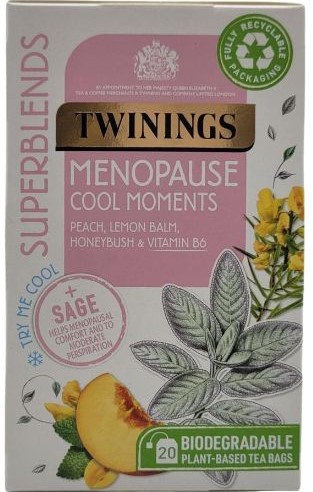

Tea also has an expanding opportunity to position itself as a key player in the energising beverage category, particularly since an increased number of consumers seek drinks that offer natural, jitter-free sources of energy. Over a third of German tea consumers are interested in RTD iced tea that can help them stay energised and in the US, a similar portion of consumers seek energy-boosting benefits in RTD tea.
Mintel’s GNPD reveals that while only 5% of tea and RTD tea products launched globally in the 12 months to August 2023 carry a functional energy claim, this figure is expected to rise as consumers turn to natural energy sources found in tea. With ingredients such as plant-derived caffeine and herbal options like yerba mate, tea can provide a milder and smoother energy lift that doesn’t have the usual jitters associated with coffee or energy drinks. As this demand grows, Mintel expects that more brands will adapt their product offerings and marketing strategies to highlight tea’s natural energy-boosting properties. By emphasising tea’s ability to provide sustainable energy through natural sources, brands can attract consumers who prioritise their health.
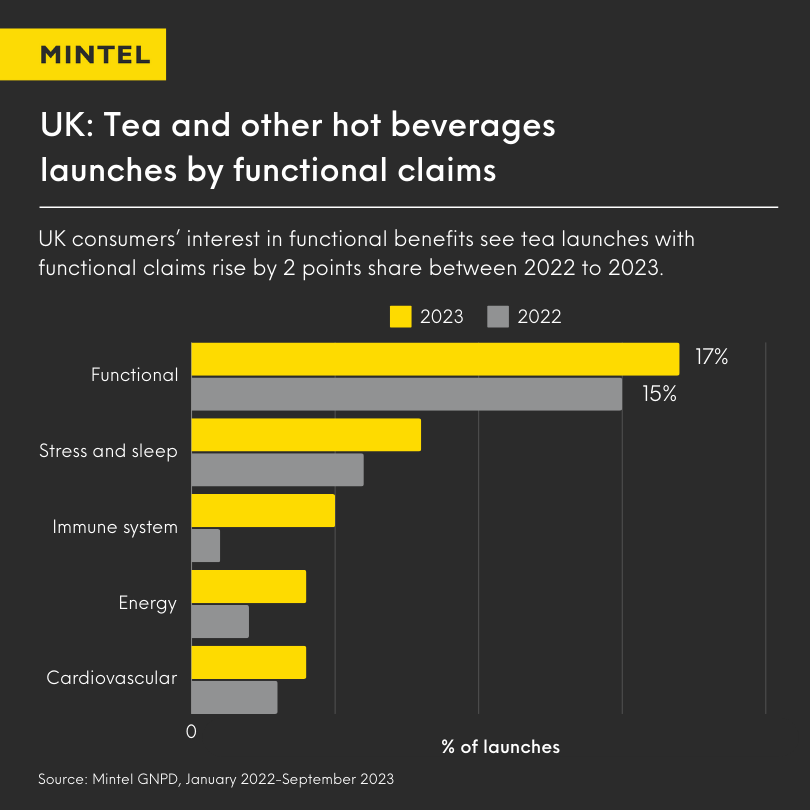

How Can Your Brand Adapt to Changing Tea Trends?
Looking ahead, the tea market is evolving rapidly, shaped by key trends like sustainability, expanding consumption occasions, and the growing demand for functional teas. With these significant shifts underway, brands without the right data or insights risk falling behind.
Mintel provides a range of solutions and expert guidance to help brands of all sizes meet consumer expectations, drive growth, and spark innovation in this ever-changing landscape.
Emerging brands can start their journey with a free Mintel Spotlight subscription. You’ll get emailed weekly updates with the latest data, along with free access to our Spotlight platform, providing insights, fresh perspectives and groundbreaking analysis into the markets that matter.
For brands seeking deeper insights and understanding into consumer behaviour, market dynamics, product development and competitive landscapes, we have a wide range of products and solutions to help you. Talk to a specialist today!
Talk to a specialist today – they’ll guide you on how to turn these insights into actionable strategies.
Want to start making data-driven decisions?
24World Media does not take any responsibility of the information you see on this page. The content this page contains is from independent third-party content provider. If you have any concerns regarding the content, please free to write us here: contact@24worldmedia.com

